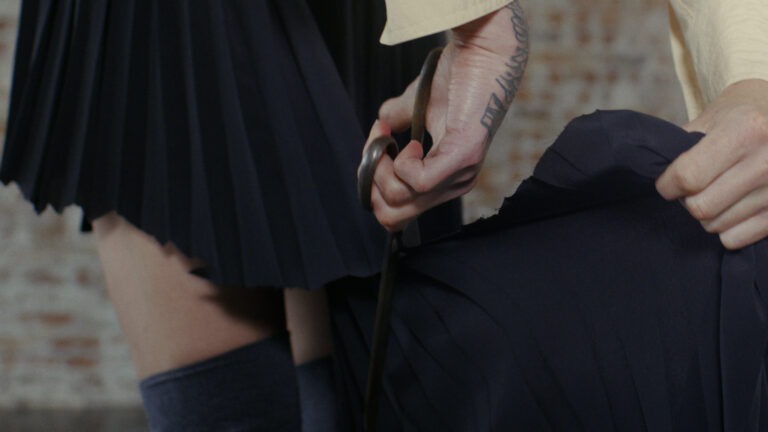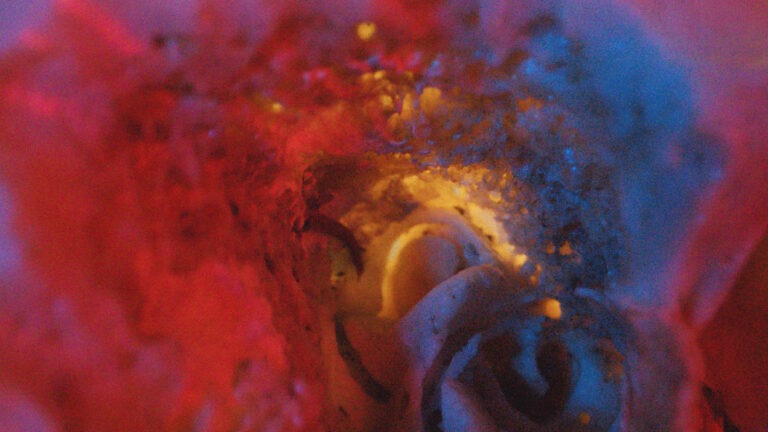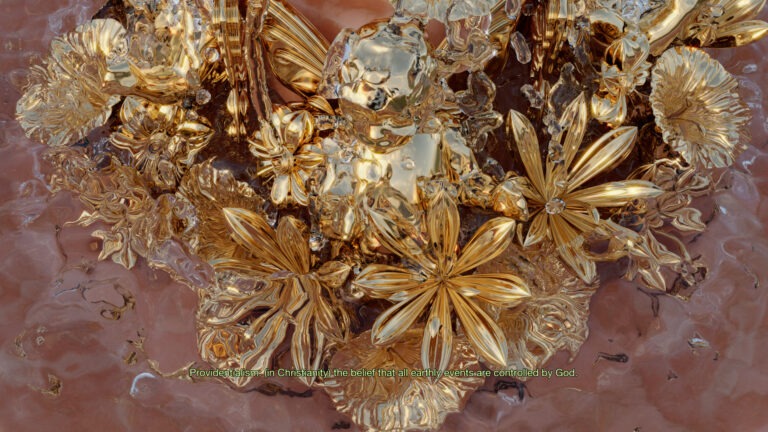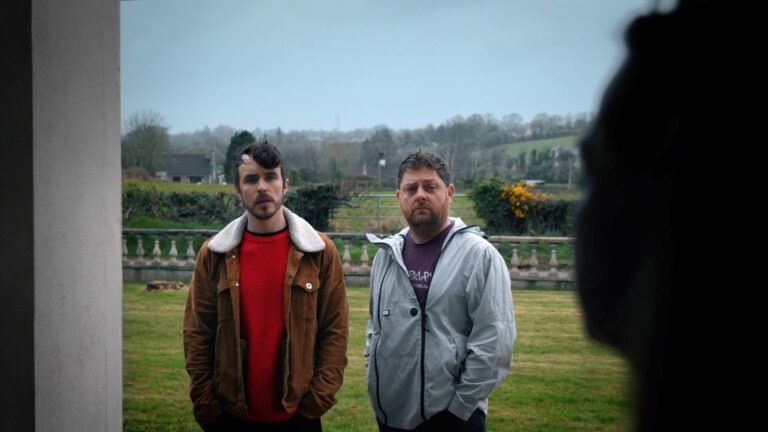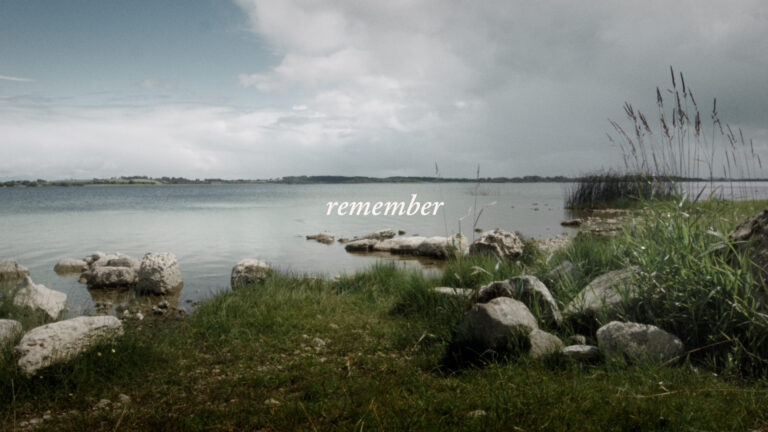aemi and Docs Ireland present: Back Translation
Each year aemi presents a programme of moving image work by artists and experimental filmmakers at Docs Ireland, aiming to call attention to the diverse ways artists and experimental filmmakers are continuing to deftly expand, enrich and challenge the conventions of the documentary form.
Both Aurélien Froment and Saskia Holmkvist will be in attendance at the Back Translation screening.
Selected by aemi for Docs Ireland, ‘Back Translation’ is made up of four new short films by artists and experimental filmmakers Keira Greene (U.K.), Aurélien Froment (France), Éiméar & Cáit McClay (Ireland) and Saskia Holmkvist (Sweden). Taken from the title of Saskia Holmkvist’s film which offers a reckoning with Belfast’s recent history as a site of violent conflict, ‘Back Translation’ refers to the act of retranslating a text back into its source language, a process undertaken in order to check a piece of translation against the original. The films in this programme all enact discrete moments or experiences from the past, applying different forms of translation as a means of addressing the gaps and enduring trauma arising from the obfuscation at play in official and inherited versions of contested pasts.
Film information:
Keira Greene, Máthair, 2024, U.K., 16 minutes
In 1954 an Irish woman travelled alone to England to give birth in secret in a Catholic Mother and Baby Home, she then returned to Ireland having given up the baby to the nuns. This event is the departure point for Keira Greene’s film Máthair. As the daughter of the child who was left in the home, Greene traces her family story along the matrilinear line, the resulting film enters into the gaps in memory and record. Máthair offers a fragmented and elliptical account of a search for knowledge in the face of institutional oppression and obfuscation; the film resists linear narrative and documentary modes, instead offering us an intense and revelatory encounter with a shared family trauma. Scant records and redacted documents describe the negation and erasure of those who passed through the church’s homes for unmarried mothers. The sensory lives of these ungraspable women are embodied in choreographed phrases performed by a group of four dancers, whose costumed movements both gesture towards and subvert the constrictive clothing regulations of Catholic institutions and the forced female labour in the church’s laundries. Glimpses of this performance are threaded between a chaotic collage of archival material and present-day online chat rooms; the only respite is found in the holding space of the landscape and the bodies of water between England and Ireland. The silences of the archive are countered by a dissonant sound score, a pulsing polyphonic composition, dense with complex sensory impressions, a chorus of unvoiced voices compelling us to stay with the problem.
Aurélien Froment, Louis et les langues (Louis and languages), 2023, U.K., 22 minutes
Louis, a young man treated for schizophrenia, lives with his mother and stepfather. He refuses his mother tongue, the English idiom, which is spoken by everyone around him. Taking refuge in the study of foreign languages, he develops a series of methods of his own as coping mechanisms. Inspired by “Le Schizo et les langues”, a book by Louis Wolfson.
Éiméar & Cáit McClay, a border of flat stones, 2023, Ireland, 9 minutes
A reflection on the Irish Potato Famine forms the basis of this new film by artist duo Cáit and Éiméar McClay. During the Famine, the British government instituted laissez-faire economic policies in Ireland, which both facilitated the mass exportation of domestic food products and circumscribed the provision of aid by the Westminster parliament. The administration framed the famine as a providential event destined to improve the Irish economy through removing peasant farmers from the land and consolidating large estates. Through analysing the destruction caused by these doctrinaire political decisions, the McClays trouble the notion of famines as natural rather than man-made disasters and provoke audiences to consider the violences and traumas associated with settler colonialism. This film lies within the context of a wider body of work by the McClays exploring the history of British colonialism in Ireland and its residual effects across the development of the post-1922 Irish Free State. Through this project, they analyse the contemporary political, cultural and economic consequences of British imperialism in relation to the processes of land reclamation and state formation enacted by the Irish people.
Saskia Holmkvist, Margaret (Back Translation), 2023, Sweden, 19 minutes
Margaret (Back Translation) is a film which suggests how difficult it is to identify how, precisely, history informs our present – even when that history seems inescapable. Weaving together staged scenes, documentary elements and archival footage, the film explores the recent history of Belfast through a series of tonally diverse scenes, by turns comic, elegiac and speculative. In 2001 an artist called Heather Allen gave an extraordinary performance in Belfast entitled KLub. Her performance commemorated Margaret Wright, whose brutal murder took place in the city in 1994, the last (official) year of The Troubles in Northern Ireland. The artist Saskia Holmkvist undertook more than a years-long investigation into Allen’s performance and its context. She started from the idea of “back translation”: in translation terminology, the act of retranslating a text back again into its source language, in order to check it against the original. Holmkvist’s film undertakes to “back translate” Allen’s performance, via Holmkvist’s own experience of post-Troubles Northern Ireland and its contemporary artistic community. In the film’s translation of past to present, a younger generation of women reflect on and re-perform a history they have only heard told. In the process, however, Margaret (Back Translation) explores how we can never simply return to, or recover, an “original” context. Somehow the film’s real subject itself remains fugitive, always just out of shot. Instead the film constructs its delicate narrative from absences, halting conversations, memories of secondhand experience, people who never quite appear from behind half-open doors…
-Mike Sperlinger
This screening will be followed by a Q&A with artists from the programme
